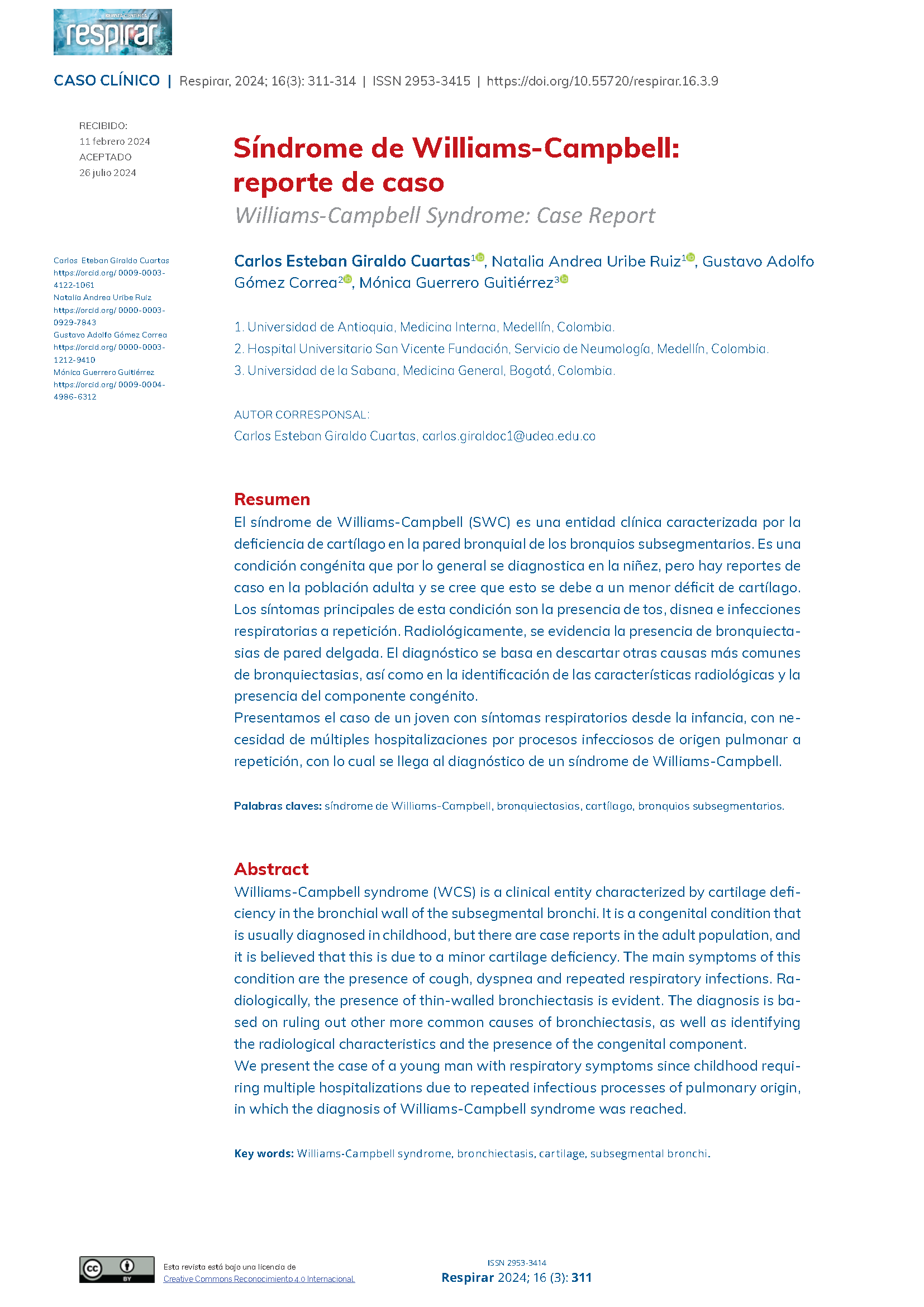Síndrome de Williams-Campbell: reporte de caso
Contenido principal del artículo
Resumen
El síndrome de Williams-Campbell (SWC) es una entidad clínica caracterizada por la deficiencia de cartílago en la pared bronquial de los bronquios subsegmentarios. Es una condición congénita que por lo general se diagnostica en la niñez, pero hay reportes de caso en la población adulta y se cree que esto se debe a un menor déficit de cartílago. Los síntomas principales de esta condición son la presencia de tos, disnea e infecciones respiratorias a repetición. Radiológicamente, se evidencia la presencia de bronquiectasias de pared delgada. El diagnóstico se basa en descartar otras causas más comunes de bronquiectasias, así como en la identificación de las características radiológicas y la presencia del componente congénito.
Presentamos el caso de un joven con síntomas respiratorios desde la infancia, con necesidad de múltiples hospitalizaciones por procesos infecciosos de origen pulmonar a repetición, con lo cual se llega al diagnóstico de un síndrome de Williams-Campbell.
Detalles del artículo
Sección

Esta obra está bajo una licencia internacional Creative Commons Atribución 4.0.
Cómo citar
Referencias
Chalmers JD, Chang AB, Chotirmall SH, Dhar R, McShane PJ. Bronchiectasis. Nat Rev Dis Primers 2018;4(1):45.
Athanazio R, Pereira MC, Gramblicka G et al. Latin America validation of FACED score in patients with bronchiectasis: an analysis of six cohorts. BMC Pulm Med 2017;17(1):73. Doi: 10.1186/s12890-017-0417-3.
Watanabe Y, Nishiyama Y, Kanayama H, Enomoto K, Kato K, Takeichi M. Congenital bronchiectasis due to cartilage deficiency: CT demonstration. J Comput Assist Tomogr 1987;11(4):701-703.
Williams H, Campbell P. Generalized bronchiectasis associated with deficiency of cartilage in the bronchial tree. Arch Dis Child 1960;35(180):182-191.
Noriega-Aldave AP, William-Saliski D. The clinical manifestations, diagnosis and management of williams-campbell syndrome. N Am J Med Sci 2014;6(9):429-432. Doi:10.4103/1947-2714.141620.
Jones QC, Wathen CG. Williams-Campbell syndrome presenting in an adult. BMJ Case Rep 2012:bcr2012006775. Doi:10.1136/bcr-2012-006775.
Kimoto T, Kawamura T, Nakahara Y, Mochizuki Y. Nihon Kokyuki Gakkai Zasshi 1999;37(5):429-432.
Liu M, Yuan Q, Zhao H, Wang Y. Williams-Campbell syndrome complicated with pulmonary hypertension and Type 2 respiratory failure: An adult case report. Clin Respir J 2019;13(12):795-799. Doi:10.1111/crj.13090.
Kaneko K, Kudo S, Tashiro M, Kishikawa T, Nakanishi Y, Yamada H. Case report: computed tomography findings in Williams-Campbell syndrome. J Thorac Imaging 1991;6(2):11-13.
Di Scioscio V, Zompatori M, Mistura I et al. The role of spiral multidetector dynamic CT in the study of Williams-Campbell syndrome. Acta Radiol 2006;47(8):798-800. Doi:10.1080/02841850600849084.
Ten Hacken NH, Kerstjens HA. Bronchiectasis. BMJ Clin Evid 2011;2011:1507.
Kelly C, Chalmers JD, Crossingham I, Relph N, Felix LM, Evans DJ, Milan SJ, Spencer S. Macrolide antibiotics for bronchiectasis. Cochrane Database Syst Rev 2018;3(3):CD012406.
Wada H, Seto R, Yamada H, Nagao T, Hajiro T, Nakano Y. Respiratory failure of Williams-Campbell syndrome is effectively treated by noninvasive positive pressure ventilation. Intern Med 2011;50(16):1729-1732. Doi:10.2169/internalmedicine.50.4971.
Leard LE, Holm AM, Valapour M et al. Consensus document for the selection of lung transplant candidates: An update from the International Society for Heart and Lung Transplantation. J Heart Lung Transplant 2021;40(11):1349-1379. Doi:10.1016/j.healun.2021.07.005.
